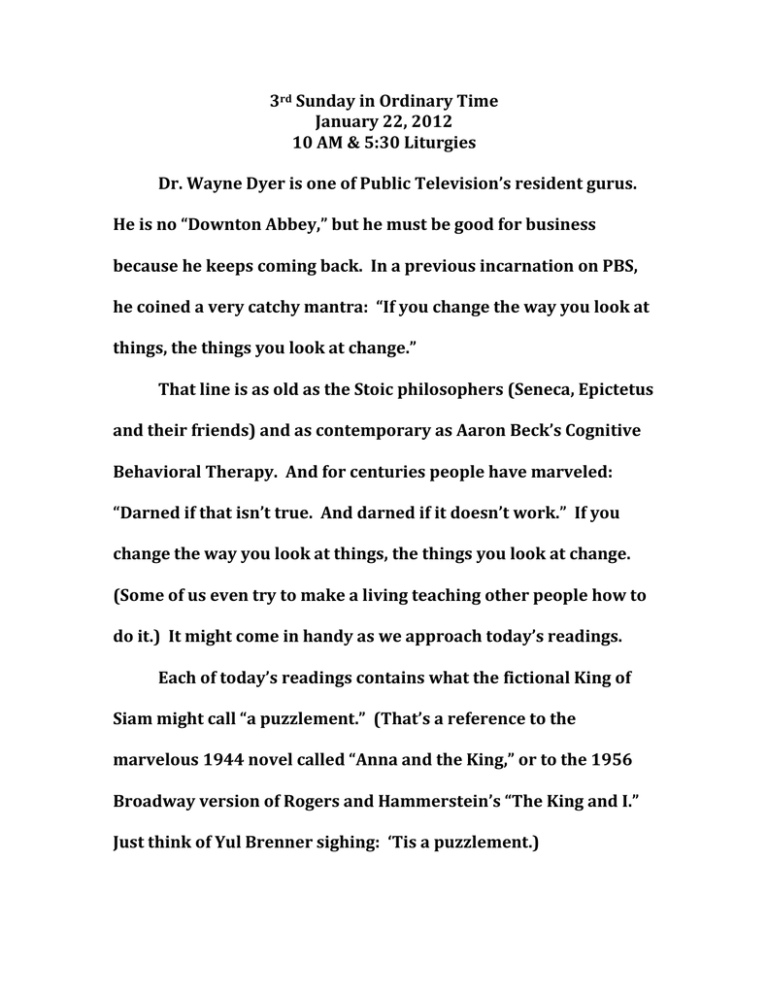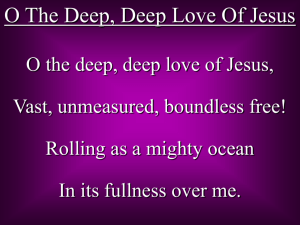3 Sunday in Ordinary Time January 22, 2012 10 AM & 5:30 Liturgies
advertisement

3rd Sunday in Ordinary Time January 22, 2012 10 AM & 5:30 Liturgies Dr. Wayne Dyer is one of Public Television’s resident gurus. He is no “Downton Abbey,” but he must be good for business because he keeps coming back. In a previous incarnation on PBS, he coined a very catchy mantra: “If you change the way you look at things, the things you look at change.” That line is as old as the Stoic philosophers (Seneca, Epictetus and their friends) and as contemporary as Aaron Beck’s Cognitive Behavioral Therapy. And for centuries people have marveled: “Darned if that isn’t true. And darned if it doesn’t work.” If you change the way you look at things, the things you look at change. (Some of us even try to make a living teaching other people how to do it.) It might come in handy as we approach today’s readings. Each of today’s readings contains what the fictional King of Siam might call “a puzzlement.” (That’s a reference to the marvelous 1944 novel called “Anna and the King,” or to the 1956 Broadway version of Rogers and Hammerstein’s “The King and I.” Just think of Yul Brenner sighing: ‘Tis a puzzlement.) In the first reading we hear that “God repents of the evil he had threatened to do.” Just think about that for a minute. God repenting? And God doing evil? Neither is a concept that makes much sense to a cradle-Catholic weaned on the Baltimore catechism. ‘Tis a puzzlement. In the second reading we hear Paul’s rather depressogenic admonition that “time is running out.” “The world in its present form is passing away.” Yet clearly, Paul was wrong—at least in any chronological sense of time. We’re reading it 2000 years later— and we’re still here. What to do with it? ‘Tis a puzzlement too! And in the gospel, Jesus urges us to repent ourselves, to change our minds about something. (That’s what the word repent means literally: to have a metanoia, to change one’s mind.) But about what? This too, is a puzzlement. But wait. Maybe a thread! All three readings invite a change—a change in us—a change in what we pay attention to, a change in perspective. And if we change the way we look at them, they may actually change themselves. If you focus on the early God of Jonah, a God so mysterious and so powerful, and so aloof and unchanging, you have a right to 2 be angry, real angry, when that God changes his mind. That God’s not supposed to change! But if you focus on a God who cannot possibly actually do evil, but is consumed (literally) in the fire of love, you get a different outcome, don’t you? It depends where you look. Or, in the case of the second reading, if good, bright, decent religious leaders make a mistake and your only option is to politely pretend that they didn’t really make a mistake but must have been thinking something else, that’s kind of sad. Even St Paul couldn’t get everything right! But he did get a lot right. And both are okay. But sometimes everybody is just wrong. Oops! But we can change the way we look at Paul. Changing one’s mind and changing where one puts one’s focus even in religious matters is okay. In fact, it’s one path to sanity and maturity. And we do have options about where we place our focus spiritually. We can change the way we look at things. Even Jesus has his moments when he apparently has to change the way he looked at things. My favorite example is Jesus confronting the Syrophoenician woman whose daughter is possessed (Mk 7: 25-30). When Jesus suggests (rather arrogantly it 3 sounds) that it’s not fit to throw away scraps to the dogs but to give it all to the children of Israel, she counters with the rather famous line that even the dogs eat the left-over scraps under the table. “Oops” again—but this time it’s “Oops” for Jesus! He heals the daughter immediately. Remember that infamous invisible Gorilla? Remember the ball and bat that costs $1.10? The way we look at things sometimes gives the wrong impression. For myself, one of the clearest examples of the need to shift focus has come with the new translations of the Roman Missal. The words now usually address a very different God from the one I’ve gotten used to over the past forty years. I don’t really address Jonah’s early God too often. My more usual God is not always leading his hosts, Thrones and Dominions, Angels and Archangels, and Powers. Sometimes maybe! But not every day! So I—and I suspect many of us—are still struggling. That’s not really God—at least not always! Sometimes it does seem fitting and right and just to address that God. I can imagine feeling quite comfortable in St. Peter’s Basilica with all it’s pomp and splendor blazing, for example. 4 But usually when I come over here to pray, I now find myself saying quietly to myself: Oops! Here is often a smaller, and more tender, and even more malleable God, who quietly and gently speaks of love and acceptance to each and every one of us every Sunday. It is a God of the gentle rain—if not exactly dewfall. If you change the way you look at things, the things you look at can change. To be sure, God will always remain “a puzzlement.” But I do have to choose which god I need to live with on a daily basis. God would have it no other way. Just ask Jonah. And may that God always be with your spirit too! 5






